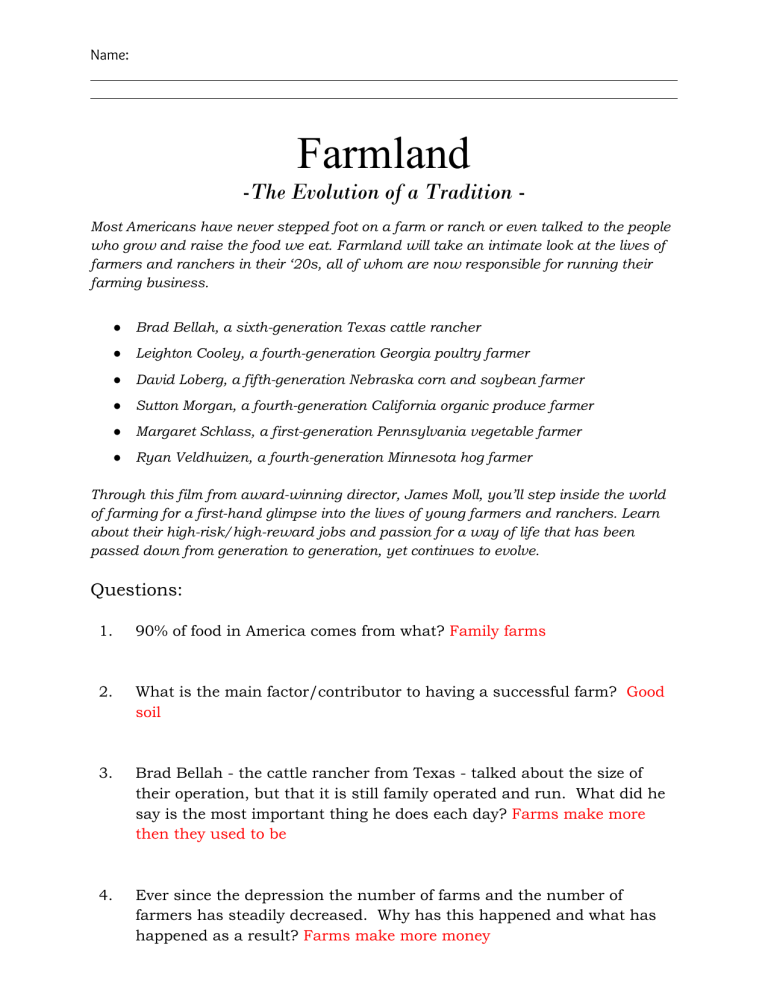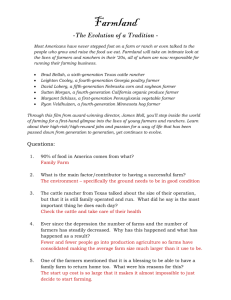
Name: Farmland -The Evolution of a Tradition Most Americans have never stepped foot on a farm or ranch or even talked to the people who grow and raise the food we eat. Farmland will take an intimate look at the lives of farmers and ranchers in their ‘20s, all of whom are now responsible for running their farming business. ● Brad Bellah, a sixth-generation Texas cattle rancher ● Leighton Cooley, a fourth-generation Georgia poultry farmer ● David Loberg, a fifth-generation Nebraska corn and soybean farmer ● Sutton Morgan, a fourth-generation California organic produce farmer ● Margaret Schlass, a first-generation Pennsylvania vegetable farmer ● Ryan Veldhuizen, a fourth-generation Minnesota hog farmer Through this film from award-winning director, James Moll, you’ll step inside the world of farming for a first-hand glimpse into the lives of young farmers and ranchers. Learn about their high-risk/high-reward jobs and passion for a way of life that has been passed down from generation to generation, yet continues to evolve. Questions: 1. 90% of food in America comes from what? Family farms 2. What is the main factor/contributor to having a successful farm? Good soil 3. Brad Bellah - the cattle rancher from Texas - talked about the size of their operation, but that it is still family operated and run. What did he say is the most important thing he does each day? Farms make more then they used to be 4. Ever since the depression the number of farms and the number of farmers has steadily decreased. Why has this happened and what has happened as a result? Farms make more money Name: 5. One of the farmers mentioned that it is a blessing to be able to have a family farm to return home too. What were his reasons for this? The start up cost is so large that it makes it almost impossible to just decide to start farming 6. All of the farmers discussed at one point why first generation farming is such a challenge. What are two of the reasons they gave? Price of land and infrastructure costs as well 7. Often time people underestimate the challenges of farming. One reason is that you have to buy seeds (input) a year in advance and that is without knowing what? The price you will receive for the product 8. The phrase “assests get trapped” was used in the movie. What does that mean? In farming the largest percentage of expenses are out front/at the beginning –they must be incurred without having any idea what the market price will be.Farmers have good years, but must save for the bad years because they will happen too David Loberg – the farmer from Nebraska - talked about the year there was snow through most of April. That really affects when they are able to get the seed into the ground. What is the ideal temperature trend for planting corn? 50 degrees and rising 9. 10. Farm vs. Business – while farming is a business, why did one of the farmers mention that he really prefers to use the term farm? The majority of the corn that ranchers feed their chickens and their cattle comes from the Midwest. When the corn price is high is will affect the input cost of raising cattle and in turn the overall profit. How does rain – too much or too little – in the Midwest affect the farmers in Texas? 11. The market price can fluctuate quite a bit within a few weeks, but when cattle are ready the ranchers do not have the luxury of waiting. Why? Name: 12. Just as we have choices as consumers, farmers also have choices for seed. What are some things they consider? 13. Did you notice in the scene with the people in the tractors that they aren’t physically driving those tractors. How does that work? 14. What is the biggest hurdle farmers face today? 15. David Loberg – the Nebraska corn and soybean farmer – said that if you don’t want to eat GMO products, that is your choice, but don’t do what? 16. GMO seed provides a better defense against what? This also cuts down on the use of what? 17. The farm always comes . This is something many feel the general public does not understand unless they came from a farm. 18. In the discussion about Hormone Free Birds. This is really about what? 19. What did they feel the government needs to do a better job explaining? 20. What does using antibiotics “medicinally” mean? 21. What is the best way for farmers to get their story out? Name: 22. How do farmers learn about their animals and their health? 23. Why is it is so easy to publicize the “bad apples” of farming? 24. They shared the statistic that 80% of the land is owned by people 65 and older. Why does it become challenging to pass that land on to others? 25. Why do you really need to have a passion for farming if you are going to choose that as your life’s path? 26. The ending song was “This Land is Your Land”. What is the significance of this song? 27. In your opinion which of the farmers faces the most challenges and why do you think that? 28. What was the biggest eye opener for you in this movie? 29. What do you think is the biggest misconception the general public has about farmers?
